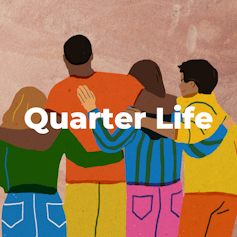Reviews of Channel 4’s new sitcom, Queenie, are divided. The good reviews have praised the show’s authenticity, while the negative ones have called it “crude” and “bland”. Having watched the show, I wonder if the real problem is that reviewers have expected the show to deliver on every count – and they want a heroine who represents the “strong Black woman”.
The show is adapted from the bestselling 2019 novel of the same name by Candice Carty-Williams. It follows Queenie, a 25-year-old British-Jamaican woman, as she breaks up with her white boyfriend and experiences dating, female friendships, everyday racism, “overfamiliar” aunties – and the impact of all of this on her health.
The novel’s opening chapter conveys all of this around the refitting of her intrauterine contraceptive device (IUD). This scene becomes more intrusive when the medical staff suspect that, despite the IUD, Queenie has had a miscarriage.
Episode one is a very faithful adaptation of that chapter. It grabs attention not so much from the invasive internal examination, but from the doctor’s comments to Queenie. “Well done you”, she says of Queenie’s “fancy career” at a national newspaper, then rebuffs her complaint about the painful procedure, saying: “I’m sure you’re fine, strong girl like you.”

No one’s 20s and 30s look the same. You might be saving for a mortgage or just struggling to pay rent. You could be swiping dating apps, or trying to understand childcare. No matter your current challenges, our Quarter Life series has articles to share in the group chat, or just to remind you that you’re not alone.
Read more from Quarter Life:
In an interview in 2019, feminist activist Roxane Gay and Carty-Williams discussed the burden of creating writing that is true to life. They agreed that both literature and society hide intimate aspects of Black women’s lives, and shared their own experiences of “toning down” their Blackness for majority white culture. And Gay appreciated Carty-Williams’s argument that “women – Black women in particular – are expected to be emotional caretakers”. The Channel 4 adaptation focuses on this emotional landscape and on the social requirement for Black women to be strong.
In another interview, Carty-Williams explained that Queenie is “unabashedly black on purpose”, but that the novel is “not just for Black people”. She worked on this TV adaptation herself, reinterpreting a novel of 30 chapters into eight tight episodes.
By marketing Queenie as “the Black Bridget Jones”, Carty-Williams recognised the gaps in published Black British writing. She complained that Black British writing is usually categorised as literary fiction, which rarely reaches the sales that genre fiction (like chick-lit) can.
Bestsellers overwhelmingly focus on “white, western, middle-class, heterosexual, able-bodied and able-minded heroines”. Despite a recent upsurge in Black British women’s writing since Bernardine Evaristo’s 2019 Booker Prize win, Black chick-lit remains obscure.
Ten years ago, film director Destiny Ekaragha argued that Black British writers and filmmakers should be able to tell ordinary family stories rather than feeling compelled to represent everything: the history of colonialism and slavery, the essence of Africa, the depths of Caribbean culture and the nuances of Black Britishness. Queenie achieves this, handling issues of race, racism, and representation with clarity and commitment.
The ‘strong black woman’
The negative reviewers seem to miss the point of Queenie somewhat. While a Guardian reviewer complains that Queenie is “so imprecise” she fails to be empathetic, Carty-Williams describes Queenie as a “messy girl”, who is “trying to figure out who she is, away from all the stereotypes”.
Just as the novel drew attention to the whiteness of the chick-lit genre in fiction through its overt engagement with sexism and racism, the TV adaptation draws attention to the whiteness of chick-flicks.
Negative reception from reviewers draws attention to their own wielding of the “burden of representation” – the phenomenon where Black writers are expected to represent all aspects of Black culture in specific, positive ways for Black empowerment.
Some reviewers want Queenie to represent every Black British woman. Instead of Carty-Williams’s “messy girl” whose imperfections are conveyed persuasively by Dionne Brown in her first major acting role, they want an exceptionally talented, resilient woman who is supporting other women and is capable of making the right decisions in any situation. They want the “strong black woman”.
The “strong black woman” film trope and societal stereotype has been associated with eating disorders and depression and with self-harm. In episode six, Queenie directly confronts the stereotype, mentioning the phrase in conversation, and begins to reject it.
Instead of asking the adaptation to beat Bridget Jones’s Diary, I think reviews should pay attention to its engagement with Jamaican British culture. It portrays the constant pressure to “get back to your best”, to be always “plucky and capable” while ensuring you’re not “too much”.
The TV adaptation is admittedly heavy-handed at times. Its discussion of Black women artists and activists feels a little like a reading list. Still, it explores stereotypes that affect many Black British women today that aren’t usually discussed.
The author has a brief cameo in the penultimate episode and overhears Queenie say: “I think it’s important to break the tradition of what a Black woman has always been, and to shift the focus away from what she did for white people”. The series is a starting point for conversations like this. Like the “strong black woman”, Channel 4’s Queenie shouldn’t be burdened with the expectation to be everything.

